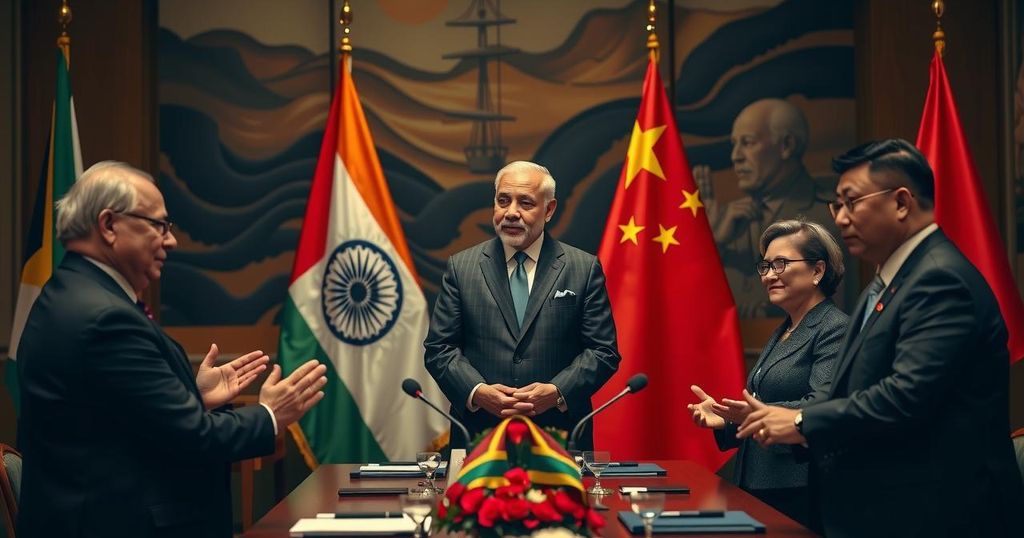The BRICS summit in Kazan, Russia, highlighted calls for a swift resolution to the Ukraine conflict by Indian Prime Minister Narendra Modi, alongside affirmations of friendship from Chinese leader Xi Jinping and South African President Cyril Ramaphosa. The event, which aims to counter narratives of Russia’s isolation, features discussions on economic cooperation and security amid a tense global environment.
At the BRICS summit in Kazan, Russia, Indian Prime Minister Narendra Modi emphasized the necessity for a swift resolution to the Ukraine conflict in discussions with President Vladimir Putin. Modi expressed India’s commitment to peaceful dispute resolution, stating, “We totally support efforts to quickly restore peace and stability.” In a parallel display of solidarity, Chinese leader Xi Jinping affirmed the depth of China’s friendship with Russia amid what he described as a “chaotic” global landscape. South African President Cyril Ramaphosa echoed similar sentiments, noting, “We continue to see Russia as a valued ally, as a valued friend… from the days of our struggle against apartheid.” Putin’s gathering of approximately 20 world leaders aims to counter perceptions of Russia’s isolation due to its actions in Ukraine and to promote Russia’s partnerships within the BRICS framework. The summit, occurring amidst intensified security due to prior drone attacks in the Tatarstan region, is the largest international event Russia has hosted since the onset of the Ukraine invasion in 2022. Key discussions include proposals for a BRICS-led payment system intended to challenge the Western-dominated financial networks, as well as addressing escalating Middle Eastern conflicts. Furthermore, Putin’s diplomatic outreach seeks to showcase Russia’s alliances with countries such as China, Iran, and North Korea, despite U.S. skepticism about the BRICS group’s geopolitical significance. Analysts suggest that this summit serves as a platform for reinforcing a multipolar world, contrasting with Western unilateralism. The ongoing security measures in Kazan highlight the complex geopolitical landscape, with additional high-stakes meetings scheduled over the next days, including talks with Turkish and Iranian leaders. Additionally, Brazilian President Luiz Inacio Lula da Silva’s unexpected absence from the summit due to a medical emergency adds to the series of events marking this significant diplomatic occasion.
The BRICS group, consisting of Brazil, Russia, India, China, and South Africa, was established to foster economic cooperation and representation of emerging nations on the global stage. Since its inception in 2009, the group has expanded to incorporate other nations but has faced internal challenges and diverging interests among its members. In light of the ongoing conflict in Ukraine, Russia seeks to bolster its relationships within BRICS to display resilience against Western sanctions and to advocate for a multipolar world order.
In conclusion, the BRICS summit in Kazan showcases the geopolitical dynamics involving Russia, India, China, and South Africa against the backdrop of the ongoing Ukraine crisis. By promoting mutual support and proposed initiatives, the leaders aim to reinforce their positions on the global stage amidst increasing tensions with Western powers. This gathering reflects a strategic effort by Russia to assert its role as a significant player within a redefined multipolar world order.
Original Source: www.courthousenews.com







